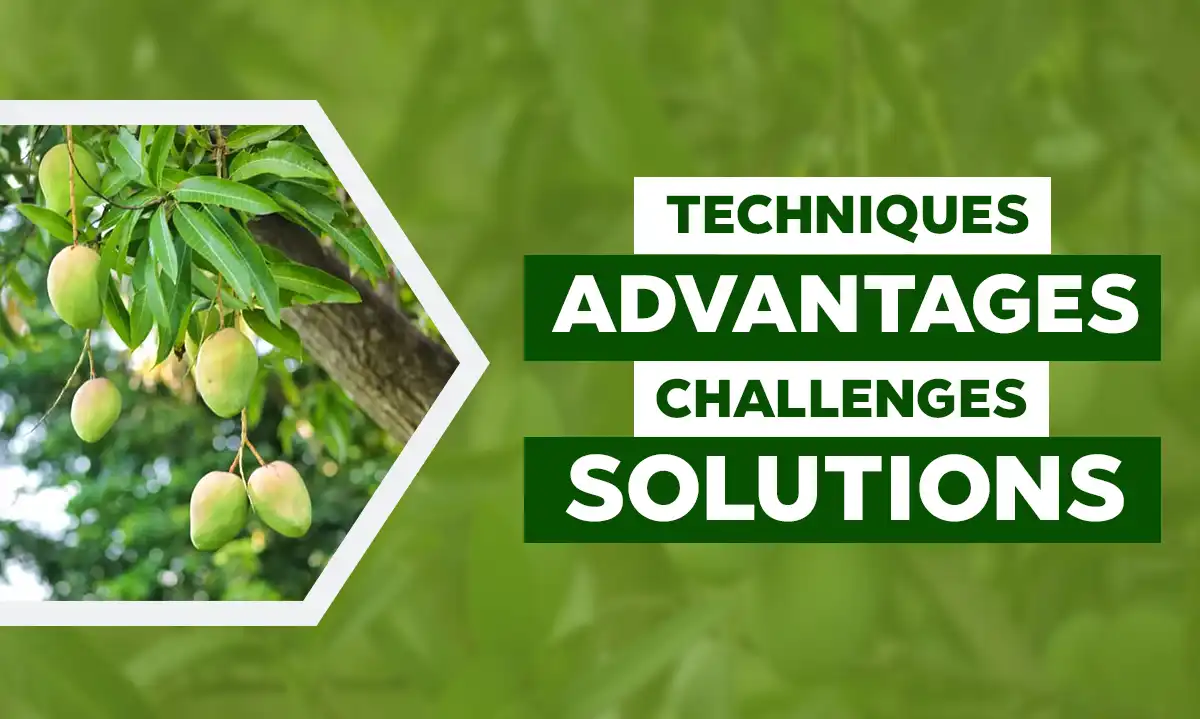The Future of Mango Farming: Techniques, Trends, and Innovations

Introduction
Mango farming is a rewarding agricultural venture with significant potential for high yields and economic benefits. Mangoes, one of the most popular and widely consumed fruits in the world, offer numerous advantages when cultivated using the right techniques. This guide explores various aspects of mango farming, including the techniques used for successful cultivation, the advantages of investing in mango farmland, and the common challenges faced by farmers. Additionally, it provides practical solutions to address these challenges, ensuring a productive and sustainable mango farming operation.
Techniques of Mango Farming
Site Selection: Choose a well-drained site with full sun exposure. Mango trees thrive in tropical and subtropical climates with temperatures ranging from 24°C to 30°C (75°F to 86°F). Avoid areas prone to severe frost.
Soil Preparation: Mango trees prefer loamy or sandy soils with excellent drainage. Conduct a soil test to determine pH and nutrient levels, aiming for a pH range of 5.5 to 7.5. Enhance soil quality by incorporating organic matter like compost or well-rotted manure and ensure proper drainage to prevent waterlogging.
Propagation Methods
Seed Propagation: Although mango trees can be grown from seeds, this method is less predictable in terms of fruit quality. Seeds should be sown in prepared seed beds or containers and kept moist until germination.
Vegetative Propagation: More commonly, mangoes are propagated through grafting or budding. Grafting involves joining a scion (a cutting from a desirable mango variety) with a rootstock, ensuring consistent fruit quality and earlier fruiting compared to seed-grown trees.
Spacing: Mango trees require ample space to grow. Plant them about 10 to 12 meters (33 to 40 feet) apart, considering their broad canopy and root system. For high-density planting, careful management is needed.
Planting Pits: Dig planting holes of 60 cm x 60 cm x 60 cm (24 inches x 24 inches x 24 inches) and fill them with a mixture of soil, compost, and a small amount of fertilizer. Plant the sapling at the same depth as it was in the nursery and ensure thorough watering.
Challenges and solutions of Mango Farming
Variability in Climate
Mangoes are susceptible to severe weather conditions. Temperature variations, heavy rain, or frost can all have a negative impact on fruit set, flowering, and overall fruit quality.
Challenge: Climate variability can lead to lower fruit yields, lower-quality fruit, and increased disease susceptibility.
Solutions: It includes selecting mango varieties that are resistant to climate change, protecting trees with shade netting or windbreaks, and keeping up with weather projections so that preventive action can be taken in a timely manner.
Diseases and Pests
Challenge: infestations and illnesses can reduce fruit productivity and quality, which can have an adverse effect on the trees' overall health.
Solutions: To manage and control pests and diseases, employ disease-resistant cultivars, apply fungicides, carry out routine inspections, and implement Integrated Pest Management (IPM) techniques.
Soil and Water Management
Mango trees need a regular supply of water and well-drained soil. Root rot and lower-quality fruit can be caused by improper irrigation and poor soil drainage.
Challenge: Poor tree health, lower yields, and inferior-quality fruit can result from improper soil and water management.
Solutions: include using organic matter to improve soil drainage, implementing drip irrigation systems, and conserving moisture through water-saving practices such as mulching.
Nutrient deficiency and imbalance
Mango trees require a steady supply of fertilizers in order to flourish. The development of fruit on trees can be impacted by nutrient imbalances or deficits can impact tree fruit development.
Challenge: Deficits in some nutrients can cause stunted growth, limited fruit production, and lowered fruit quality.
Solutions: Use balanced fertilizers that contain vital nutrients, do routine soil testing to assess the levels of nutrients, and, if necessary, apply foliar sprays for prompt nutrient replacement.
Work and Administration
Mango farming necessitates the use of trained labor for operations like pest control, pruning, and harvesting. Farm operations may be impacted by rising expenses and a labor shortage.
Challenge: Inadequate or unskilled labor can lead to lower production, higher operating costs, and inefficiencies.
Solutions: To ensure a dependable and efficient workforce, invest in worker training programs, consider mechanization to reduce labor costs, and implement strong labor management practices.
Advantages of Mango Farmland
High-Quality Produce: Mango farmland yields excellent mangoes known for their rich flavor, sweetness, and nutritional benefits. Well-managed farms contribute to the superior taste and quality of the fruit.
Economic Benefits: Mango cultivation can be financially rewarding, providing substantial revenue through domestic and international markets. It supports local economies and job creation.
Employment Opportunities: Mango farmland generates employment for various individuals, including farm laborers, managers, and those involved in packing and distribution. This contributes to community development.
Sustainable Agriculture: Mango farms can implement sustainable farming practices that enhance soil health, reduce water usage, and minimize chemical inputs. This promotes environmental sustainability and conservation of natural resources.
Biodiversity: Mango farms support biodiversity by providing habitat for various plant and animal species. Integrating other crops and natural vegetation around mango plantations can improve ecological health.
Conclusion
In conclusion, mango farming presents a promising opportunity for farmers looking to benefit from the high demand for this cherished fruit. By employing effective cultivation techniques and understanding the advantages and challenges of mango farming, growers can enhance their success. Addressing challenges through innovative solutions not only improves productivity but also supports sustainable farming practices. With careful planning and management, mango farming can lead to bountiful yields, economic growth, and the preservation of traditional agricultural practices. Investing in mango farmland offers the potential for rewarding outcomes, benefiting both farmers and consumers alike.
Latest blogs
JOIN OUR COMMUNITY !
Stay connected with Getfarms! Follow us on social media for the latest updates, exclusive offers, and a glimpse into the world of farmhouse living. Join our community today




























